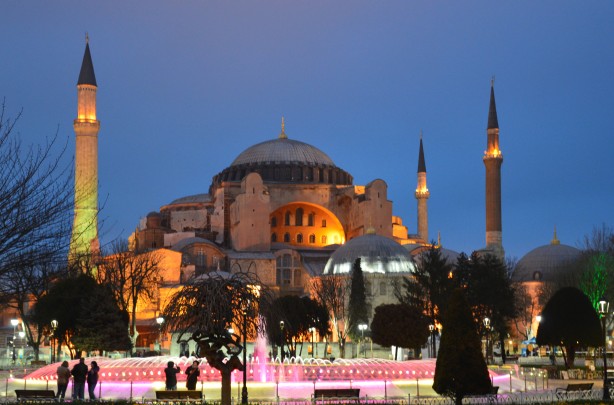All AP Art History Resources
Example Questions
Example Question #843 : Ap Art History
What is the drum of a building?
Floor under a dome
Dome
Circular opening of a dome
Wall that supports a dome
Wall that supports a dome
The drum of a building is the circular wall that supports a dome.
Example Question #52 : Architecture
What type of vaulting has has six sections?
Fan vaulting
Sexpartite rib vaulting
Groin vaulting
Quadripartite vaulting
Barrel vaulting
Sexpartite rib vaulting
In sexpartite rib vaulting, each vault is divided into six sections by three ribs.
Example Question #1 : Understanding Terminology That Describes Early Christian, Byzantine, And Early Medieval Architecture
What is a pietá?
A painted or carved representation of a dying Christ
A painted or carved representation of the Annunciation
A painted or carved representation of the pious Mary
A painted or carved representation of Mary with a dead Christ in her arms
A painted or carved representation of Mary with a dead Christ in her arms
A pieta is a carved or painted artistic depiction of Mary holding her son Jesus in her arms after his crucifixion. When this depiction includes other people in the scene, it is referred to as the Lamentation.
Example Question #844 : Ap Art History
What is a finial?
A son or daughter depicted in an official portrait of a royal family
A crowning ornament on a building
A small piece in a mosaic
A repeated design
A decorative wall
A crowning ornament on a building
A finial is a crowning ornament on a pinnacle, tower, or roof of a building.
Example Question #1 : Understanding Terminology That Describes Early Christian, Byzantine, And Early Medieval Architecture
In a mosque, such as the mosque built in Cordoba by Islamic Umayyad royalty exiled from Damascus, the mihrab is __________.
a raised area where the Imam stands during the call to prayer
a dome built in a style foreshadowing Gothic cathedral construction
a horseshoe-shaped arch common in Islamic architecture
a prayer niche indicating the wall of the mosque facing Mecca
a piece of devotional artwork in a geometric style
a prayer niche indicating the wall of the mosque facing Mecca
The mihrab is a prayer niche set in the qibla wall of a mosque, or the wall facing Mecca. It indicates in which direction the congregation must pray.
Example Question #251 : 3 D Art
A(n) ______________ is a processional walkway around the apse in a basilica church, or the central space in a centrally-planned church.
ambulatory
nave
clerestory
aisle
ambulatory
The processional walkway around the apse of a basilica church is called an ambulatory. It is a continuation of the aisles that run alongside the central space of the nave. Often individual shrines or altars for saints were set up along the ambulatory behind the main altar.
Example Question #252 : 3 D Art
Which term refers to the style of art and architecture that emerged from the unification of Europe under a centralized Christian aesthetic, inaugurating a massive series of building projects as the Church became the chief patron of the arts?
Gothic Architecture
Romanesque Architecture
The International Style
Byzantine Architecture
Romanesque Architecture
The Romanesque movement inaugurated the great building projects of the church. Though Byzantine, Gothic, and International style movements are likewise responsible for many of Europe's greatest holy buildings, they are all continuations of and evolutions from the Romanesque style. This question requires students to know the chronology of their aesthetic movements.
Example Question #1 : Romanesque Architecture
Semi-circular arches from the first millenneum CE are a common feature of European churches in the style of architecture known as __________.
Gothic
Byzantine
Romanesque
Classical
Romanesque
Romanesque churches dominated European architecture from sometime in the mid-to-late first millennium CE until about 1200. Romanesque churches were massive stone edifices that were marked out by having their doors and windows constructed out of simple semi-circular arches. Romanesque architecture was largely supplanted by the much more ornate and imposing Gothic style in the late Middle Ages.
Example Question #2 : Romanesque Architecture
The sides of a door or window frame, often decorated with sculpture in medieval churches, is called a _____________.
cornice
portal
jamb
tympanum
jamb
The side of a window frame or doorway in a medieval church is called a jamb. In medieval churches, the portal (or entrance way) often was elaborated with decorative sculpture on every available surface, including the jamb and the tympanum, the semi-circular or triangular wall space over a door.
Example Question #21 : Early Christian, Byzantine, And Early Medieval Architecture

In what part of the world is this building located?
The Middle East
Eastern Asia
Western Europe
North Africa
The Middle East
This is the Hagia Sophia. It is located in Istanbul, on the Black Sea, in Turkey. There are hints of the location of the work in the style of the building. Consider the domed top, mixed with the towers on the corner. It is a unique blending of Greek and Islamic artistic influence.
Image adapted from http://www.publicdomainpictures.net/hledej.php?hleda=hagia+sophia+5.
All AP Art History Resources




